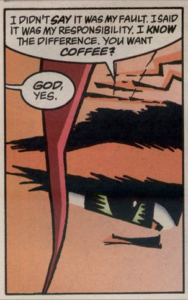If you have a friend that will reprove your faults and foibles, consider you enjoy a blessing, which the king upon the throne cannot have.
James Burgh (1714-1775) British politician and writer
The Dignity of Human Nature, Book 1 “Of Prudence” (1754)
(Source)
Quotations about:
fault
Note not all quotations have been tagged, so Search may find additional quotes on this topic.
Men ought to feel most annoyed with what has been brought about by their own fault.
[Ea molestissime ferre homines debent quae ipsorum culpa contracta sunt.]
Marcus Tullius Cicero (106-43 BC) Roman orator, statesman, philosopher
Epistulae ad Fratrem Quintum [Letters to His Brother Quintus], Book 1, Letter 1, sec. 3 (1.1.3) (60 BC) [tr. Williams (Loeb) (1928)]
(Source)
(Source (Latin)). Alternate translations:Men are naturally most concerned at misfortunes which have been incurred by their own fault.
[tr. Watson (1896)]Men ought to be most annoyed by the sufferings which come from their own faults.
[ed. Hoyt (1896)]Men ought to feel most vexed at what has been brought upon them by their own fault.
[tr. Shuckburgh (1900), # 29]It is the misfortunes for which they are ourselves to blame that ought to distress people the most.
[tr. Shackleton Bailey (1978), # 1]
The fault no child ever loses is the one he was most punished for.
Mignon McLaughlin (1913-1983) American journalist and author
The Neurotic’s Notebook, ch. 2 (1963)
(Source)
The Master did himself these vessels frame,
Why should he cast them out to scorn and shame?
If he has made them well, why should he break them?
Yea, though he marred them, they are not to blame.
Omar Khayyám (1048-1123) Persian poet, mathematician, philosopher, astronomer [عمر خیام]
Rubáiyát [رباعیات] [tr. Whinfield (1883), # 126; Fitz. # 86]
(Source)
Various of the sources I consulted (e.g.) tied the "vessels" quatrain and the "quick and dead" quatrain together, even though some translators (as below) went in both directions.
Alternate translations:None answer'd this; but after Silence spake
A Vessel of a more ungainly Make:
"They sneer at me for leaning all awry;
What! did the Hand then of the Potter shake?"
[tr. FitzGerald, 1st ed. (1859), # 63]None answer'd this; but after Silence spake
A Vessel of a more ungainly Make:
"They sneer at me for leaning all awry;
What! did the Hand then of the Potter shake?"
[tr. FitzGerald, 2nd ed. (1868), # 93]After a momentary silence spake
Some Vessel of a more ungainly Make;
"They sneer at me for leaning all awry:
What! did the Hand then of the Potter shake?"
[tr. FitzGerald, 3rd ed. (1872), # 86; also 4th ed. and 5th ed. (1889)]Thou who commandest the quick and the dead, the wheel of heaven obeys thy hand. What if I am evil, am I not Thy slave? Which then is the guilty one? Art Thou not Lord of all?
[tr. McCarthy (1879), # 344; in some # 345]The potter did himself these vessels frame,
What makes him cast them out to scorn and shame?
If he has made them well, why should he break them?
And though he marred them, they are not to blame.
[tr. Whinfield (1882), # 52]Who framed the lots of quick and dead but Thou?
Who turns the wheel of baleful fate but Thou?
We are Thy slaves, our wills are not our own,
We are Thy creatures, our creator Thou!
[tr. Whinfield (1882), # 242]Who framed the lots of quick and dead but Thou?
Who turns the troublous wheel of heaven but Thou?
Though we are sinful slaves, is it for Thee
To blame us? Who created us but Thou?
[tr. Whinfield (1883), # 471]From God's own hand this earthly vessel came,
He shaped it thus, be it for fame or shame;
If it be fair -- to God be all the praise,
If it be foul -- to God alone the blame.
[tr. Le Gallienne (1897)]Almighty Potter, on whose wheel of blue
The world is fashioned and is broken too,
Why to the race of men is heaven so dire?
In what, O wheel, have I offended you?
[tr. Le Gallienne (1897)]Our Guardian chose our natures. Is He then
Delinquent when He treats us with disorder?
We ask: "Why break the best of us?" and murmur:
"Is the pot guilty if it stands awry?"
[tr. Graves & Ali-Shah (1967), # 93]When the Maker formed nature
Why imperfect was the venture
If it is good, why departure
And if bad, why form capture?
[tr. Shahriari (1998), literal]When the Creator forged the shape
Why was mankind a mere ape?
If it were good, why cloak and cape?
If unsightly, why this rape?
[tr. Shahriari (1998), figurative]
I notiss that when a man runs hiz hed aginst a post, he cusses the post fust, all kreashun next, and sumthing else last, and never thinks ov cussing himself.
[I notice that when a man runs his head against a post, he cusses the post first, all creation next, and something else last, and never thinks of cussing himself.]
Josh Billings (1818-1885) American humorist, aphorist [pseud. of Henry Wheeler Shaw]
Josh Billings’ Trump Kards, ch. 7 “When I waz a Boy” (1874)
(Source)
Shew a good man his errour and he turnes it to a vertue, but an ill man doubles his fault.
George Herbert (1593-1633) Welsh priest, orator, poet.
Jacula Prudentum, or Outlandish Proverbs, Sentences, &c. (compiler), # 655 (1640 ed.)
(Source)
In daily life we are more often liked for our defects than for our qualities.
[Nous plaisons plus souvent dans le commerce de la vie par nos défauts que par nos bonnes qualités.]
François VI, duc de La Rochefoucauld (1613-1680) French epigrammatist, memoirist, noble
Réflexions ou sentences et maximes morales [Reflections; or Sentences and Moral Maxims], ¶90 (1665-1678) [tr. Tancock (1959)]
(Source)
This first appeared in the 5th Ed. (1678). See bottom for parallel maxims.
(Source (French)). Alternate translations:We are often more agreeable through our faults, than through our good qualities.
[pub. Donaldson (1783), ¶130; [ed. Lepoittevin-Lacroix (1797), ¶97]We often appear to be more agreeable in our faults than in our good qualities.
[ed. Carvill (1835), ¶114]In the intercourse of life we more often please by our faults than our good qualities.
[ed. Gowens (1851), ¶232]In the intercourse of life, we please more by our faults than by our good qualities.
[tr. Bund/Friswell (1871), ¶90]In everyday existence we please others more by our faults than by our merits.
[tr. Heard (1917), ¶228]In the ordinary intercourse of life our faults give more pleasure than our virtues.
[tr. Stevens (1939), ¶90]In daily life our faults are frequently more pleasant than our good qualities.
[tr. FitzGibbon (1957), ¶90]In the business of living our faults are often more attractive than our virtues.
[tr. Kronenberger (1959), ¶90]In our dealings with the world, we often please more by our faults than by our good qualities.
[tr. Whichello (2016), ¶90]
The attractiveness of vice or faults versus virtue in human nature was not an uncommon theme in La Rochefoucauld's maxims. Consider the following:There are some who are disgusting in their merits, and others who please with their faults.
[tr. Winchello (2016), ¶155]
[Il y a des gens dégoûtants avec du mérite, et d’autres qui plaisent avec des défauts.]
[1st ed.]There are people whose faults beseem them well, and others whose good qualities disgrace them.
[tr. Winchello (2016), ¶251]
[Il y a des personnes à qui les défauts siéent bien, et d’autres qui sont disgraciées avec leurs bonnes qualités.]
[1st ed.]There are people who enjoy the approval of the world whose sole merit consists in their having vices that are useful in the general affairs of life.
[tr. Winchello (2016), ¶273]
[Il y a des gens, qu’on approuve dans le monde, qui n’ont pour tout mérite que les vices qui servent au commerce de la vie.]
[1st ed.]There are certain faults which, when displayed in a flattering light, shine more brightly than virtue itself.
[tr. Winchello (2016), ¶354]
[Il y a de certains défauts qui, bien mis en œuvre, brillent plus que la vertu même.]
[4th ed.]There are bad qualities which make for great talents.
[tr. Winchello (2016), ¶468]
[Il y a de méchantes qualités qui font de grands talents.]
[5th ed.]
Few vices are more certain to prevent you from having lots of friends than possessing too many virtues.
[Il y a peu de vices qui empêchent un homme d’avoir beaucoup d’amis, autant que peuvent le faire de trop grandes qualités.]Nicolas Chamfort (1741-1794) French writer, epigrammist (b. Nicolas-Sébastien Roch)
Products of Perfected Civilization [Produits de la Civilisation Perfectionée], Part 1 “Maxims and Thoughts [Maximes et Pensées],” ch. 2, ¶ 110 (1795) [tr. Parmée (2003), ¶ 90]
(Source)
(Source (French)). Alternate translations:There are few vices that prevent a man from having many friends so much as his too high qualities prevent him.
[tr. Hutchinson (1902), "The Cynic's Breviary"]There are few vices as likely to diminish the number of a man's friends, as can an excessive possession of fine qualities.
[tr. Mathers (1926), ¶ 90]There are few vices that will so readily prevent a man from having many friends as will the possession of inordinate talents or virtues.
[tr. Merwin (1969)]Few vices can prevent a man from having as many friends as too great of qualities can.
[tr. Siniscalchi (1994), ¶ 110]
Doubtless we’re all mistaken so — ’tis true,
Each is in something a Suffenus too:
Our neighbour’s failing on his back is shown,
But we don’t see the wallet on our own.[Nimirum idem omnes fallimur, neque est quisquam
quem non in aliqua re videre Suffenum
possis. Suus cuique attributus est error,
sed non videmus manticae quod in tergo est.]Catullus (c. 84 BC – c. 54 BC) Latin poet [Gaius Valerius Catullus]
Carmina # 22 “To Varus,” ll. 18-21 [tr. Cranstoun (1867)]
(Source)
Discussing Suffenus, a prolific (but very mediocre) poet, who believes himself to be extremely clever and talented. The metaphor in the last few lines reference Aesop's fable of the two bags.
(Source (Latin)). Alternate translations:Yet all to such errors are prone, I believe;
Each man in himself a Suffenus may find:
The failings of others we quickly perceive,
But carry our own imperfection behind.
[tr. Nott (1795), # 19]Yet we are all, I doubt, in truth
Deceived like this complacent youth;
All, I am much afraid, demean us
In some one thing just like Suffenus.
For still to every man that lives
His share of errors Nature gives;
But they, as 'tis in fable sung,
Are in a bag behind us hung;
And our formation kindly lacks
The power to see behind our backs.
[tr. Lamb (1821)]Yet, which of us is there but makes
About himself as odd mistakes?
In some one thing we all demean us
Not less absurdly than Suffenus;
For vice or failing, small or great,
Is dealt to every man by fate.
But in a wallet at our back
Do we our peccadilloes pack,
And, as we never look behind,
So out of sight is out of mind.
[tr. T. Martin (1861)]Friend, 'tis the common error; all alike are wrong,
Not one, but in some trifle you shall eye him true
Suffenus; each man bears from heaven the fault they send,
None sees within the wallet hung behind, our own.
[tr. Ellis (1871)]In sooth, we all thus err, nor man there be
But in some matter a Suffenus see
Thou canst: his lache allotted none shall lack
Yet spy we nothing of our back-borne pack.
[tr. Burton (1893)]Still, we are all the same and are deceived, nor is there any man in whom you can not see a Suffenus in some one point. Each of us has his assigned delusion: but we see not what's in the wallet on our back.
[tr. Smithers (1894)]True enough, we all are under the same delusion, and there is no one whom you may not see to be a Suffenus in one thing or another. Everybody has his own fault assigned to him: but we do not see that part of the bag which hangs on our back.
[tr. Warre Cornish (1904)]After all, every man of us is deceived in the same way, nor is there any one in whom, in some trait or another, you cannot recognize a Suffenus. Every one has his weak point, but we do not see what lies in that part of our wallet which is behind our backs.
[tr. Stuttaford (1912)]Sure, all men into some such error fall,
There's a Suffenus in us one and all,
Each has his proper fault and each is blind
To the wallet's other half that hangs behind.
[tr. MacNaghten (1925)]Have we not all some faults like these?
Are we not all Suffenuses?
In others the defect we find,
But cannot see our sack behind.
[tr. Landor (c. 1926)]And we (all of us) have the same rich glow, the rapture
when writing verse. And there is no one living
who cannot find within him something of Suffenus,
each his hallucination that blinds him,
nor can he nor his sharp eyes discover
the load on his own shoulders.
[tr. Gregory (1931)]Well, we all fall this way! There's not a person
whom in some matter you can fail to see
to be Suffenus. We cart round our follies,
but cannot see the bags upon our backs.
[tr. Fraser (1961)]Conceited? Yes, but show me a man who isn't:
someone who doesn't seem like Suffenus in something.
A glaring fault? It must be somebody else's:
I carry mine in my backpack & ignore them.
[tr. C. Martin (1979)]Of course we’re all deceived in the same way, and
there’s no one who can’t somehow or other be seen
as a Suffenus. Whoever it is, is subject to error:
we don’t see the pack on our own back.
[tr. Kline (2001)]Clearly we are all deceived in the same way, nor is there anyone
Whom you could see not to be Suffenus in some thing.
To each one of us one's own mistakes have been assigned;
but we do not see the knapsack which is on our back.
[tr. Drudy (1997)]Ah well, we all make that mistake -- there's not
one of us whom you can't in some small way
see as Suffenus. Each reveals his inborn flaw --
and yet we're blind to the load on our own backs!
[tr. Green (2005)]Evidently we all falter in the same way, and there is no one
whom you cannot see Suffenus in some fashion.
To each man is attributed his own error;
but we do not see the kind of knapsack which is on our back.
[tr. Wikibooks (2017)]Evidently we all are deceived the same way, nor is there anyone
whom you are not able to see Suffenus in some way.
To each their own error has been assigned;
but we do not see the knapsack which is on our back.
[tr. Wikisource (2018)]
A man always blames the woman who fools him. In the same way he blames the door he walks into in the dark.
H. L. Mencken (1880-1956) American writer and journalist [Henry Lewis Mencken]
A Little Book in C Major, ch. 6, § 1 (1916)
(Source)
Repeated in A Book of Burlesques, ch. 12 "The Old Subject," § 6 (1924)] and Chrestomathy, ch. 30 "Sententiae" (1949).
Pride plays a greater part than kindness in our censure of a neighbor’s faults. We criticize faults less to correct them, than to prove that we do not possess them.
[L’orgueil a plus de part que la bonté aux remontrances que nous faisons à ceux qui commettent des fautes; et nous ne les reprenons pas tant pour les en corriger que pour leur persuader que nous en sommes exempts.]
François VI, duc de La Rochefoucauld (1613-1680) French epigrammatist, memoirist, noble
Réflexions ou sentences et maximes morales [Reflections; or Sentences and Moral Maxims], ¶37 (1665-1678) [tr. Heard (1917)]
(Source)
Present from the first edition. (Source (French)). Alternate translations:We are liberal of our remonstrances and reprehensions towards those, whom we think guilty of miscarriages; but we therein betray more pride, than charity. Our reproving them does not so much proceed from any desire in us of their reformation, as from an insinuation that we our selves are not chargeable with the like faults.
[tr. Davies (1669), ¶142]Pride hath a greater share than Goodness in the reproofs we give other people for their faults; and we chide them, not so much with a design to mend them, as to make them believe that we ourselves are not guilty of them.
[tr. Stanhope (1694), ¶38]Pride is more concerned than benevolence in our remonstrances to persons guilty of faults; and we reprove them not so much with a design to correct, as to make them believe that we ourselves are free from such failings.
[pub. Donaldson (1783), ¶349; ed. Lepoittevin-Lacroix (1797), ¶37]In our reprehensions, pride has a greater share than good nature. We reprove, not so much in order to correct, as to intimate that we hold ourselves free from such failings.
[ed. Carville (1835), ¶309]Pride has a greater share than goodness of heart in the remonstrances we make to those who are guilty of faults; we reprove not so much with a view to correct them as to persuade them that we are exempt from those faults ourselves.
[ed. Gowens (1851), ¶38]Pride has a larger part than goodness in our remonstrances with those who commit faults, and we reprove them not so much to correct as to persuade them that we ourselves are free from faults.
[tr. Bund/Friswell (1871), ¶37]Pride, rather than virtue, makes us reprove those who have done wrong; our reproaches are not so much intended to improve the evil-doer, as to show him that we are quite free of his taint.
[tr. FitzGibbon (1957), ¶37]Pride plays a greater part than kindness in our remonstrating with those who make mistakes; and we point out their faults, less to correct them than to indicate they are not ours.
[tr. Kronenberger (1959), ¶37]Pride plays a greater part than kindness in the reprimands we address to wrongdoers; we reprove them not so much to reform them as to make them believe that we are free from their faults.
[tr. Tancock (1959), ¶37]Pride shares a greater part than the goodness of our hearts in the reprimands we give to those who commit faults; and we do not reprove so much in order to correct them, as in order to persuade them that we are ourselves exempt from those faults.
[tr. Whichello (2016), ¶37]
But we are so blind to our own shortcomings, so wide awake to those of others. Everything that happens to us is always the other person’s fault. Angelina would have gone on loving Edwin forever and ever and ever if only Edwin had not grown so strange and different. Edwin would have adored Angelina through eternity if Angelina had only remained the same as when he first adored her.
It is a cheerless hour for you both when the lamp of love has gone out and the fire of affection is not yet lit, and you have to grope about in the cold, raw dawn of life to kindle it. God grant it catches light before the day is too far spent. Many sit shivering by the dead coals till night come.Jerome K. Jerome (1859-1927) English writer, humorist [Jerome Klapka Jerome]
Idle Thoughts of an Idle Fellow, “On Being In Love” (1886)
(Source)
But we are so blind to our own shortcomings, so wide awake to those of others. Everything that happens to us is always the other person’s fault. Angelina would have gone on loving Edwin forever and ever and ever if only Edwin had not grown so strange and different. Edwin would have adored Angelina through eternity if Angelina had only remained the same as when he first adored her.
It is a cheerless hour for you both when the lamp of love has gone out and the fire of affection is not yet lit, and you have to grope about in the cold, raw dawn of life to kindle it. God grant it catches light before the day is too far spent. Many sit shivering by the dead coals till night come.Jerome K. Jerome (1859-1927) English writer, humorist [Jerome Klapka Jerome]
Idle Thoughts of an Idle Fellow, “On Being in Love” (1886)
(Source)
O clear and noble conscience, how sharply a little fault stings you!
[O dignitosa coscïenza, e netta,
come t’è picciol fallo amaro morso!]Dante Alighieri (1265-1321) Italian poet
The Divine Comedy [Divina Commedia], Book 2 “Purgatorio,” Canto 3, l. 8ff (3.8-9) (1314) [tr. Kline (2002)]
(Source)
Observing his guide, Virgil, upset over one of his own lapses.
(Source (Italian)). Alternate translations:O matchless dignity of stainless thought!
Thus bitter seems to you the taste of Sin!
[tr. Boyd (1802), st. 2]O clear conscience and upright
How doth a little sting wound thee sore!
[tr. Cary (1814)]Oh, dignity of conscience, when complete,
How small will bitter make that once was sweet!
[tr. Bannerman (1850)]O noble conscience, and without a stain,
How sharp a sting is trivial fault to thee!
[tr. Longfellow (1867)]O conscience, dignified and pure, how bitter a sting is a small fault to thee!
[tr. Butler (1885)]O conscience honourably pure, to thee
How is a little fault most bitterly shrived!
[tr. Minchin (1885)]O conscience, upright and stainless, how bitter a sting to thee is little fault!
[tr. Norton (1892)]O noble conscience and clear, how sharp a sting gives a little fault to thee!
[tr. Wicksteed (1899)]O pure and noble conscience, how bitter a sting to thee is a little fault!
[tr. Sinclair (1939)]O honourable conscience, clear and chaste,
How small a fault stings thee to bitter smart!
[tr. Binyon (1943)]O noble conscience, clear and undefaced,
How keen thy self-reproach for one small slip!
[tr. Sayers (1955)]O noble conscience without stain! how sharp
the sting of a small fault is to your sense!
[tr. Ciardi (1961)]O pure and noble conscience, how bitter
a sting is a little fault to you!
[tr. Singleton (1973)]O dignity of conscience, noble, chaste,
how one slight fault can sting you into shame!
[tr. Musa (1981)]O conscience so precious and so clear,
How small a fault is a sharp tooth to you!
[tr. Sisson (1981)]O pure and noble conscience, you in whom
each petty fault becomes a harsh rebuke!
[tr. Mandelbaum (1982)]O worthy clear conscience, how bitter a bite to you is even a little fault!
[tr. Durling (2003)]Such dignity of conscience, clear and clean,
bitten so keenly by so slight a fault!
[tr. Kirkpatrick (2007)]O pure and noble conscience,
how bitter is the sting of your least fault!
[tr. Hollander/Hollander (2007)]But O, how purest consciences are stung
By tiny faults, bitter on noble tongues!
[tr. Raffel (2010)]
Because
He is all-powerful, must all-good, too, follow?
I judge but by the fruits — and they are bitter —
Which I must feed on for a fault not mine.
He that avoideth not small faults, by little and little falleth into greater.
[Qui parvos non devitat defectus, paulatim labitur ad majora.]
Thomas à Kempis (c. 1380-1471) German-Dutch priest, author
The Imitation of Christ [De Imitatione Christi], Book 1, ch. 25, v. 10 (1.25.10) (c. 1418-27) [tr. Anon. (1901)]
(Source)
Cross-referenced in some sources to Ecclesiasticus (Sirach) 19:1 -- "One who despises small things will fail little by little."
(Source (Latin)). Alternate translations:He that will not flee small sins, shall by little and little fall into greater.
[tr. Whitford/Raynal (1530/1871)]He who will not flee small sins will, by little and little, fall into greater sins.
[tr. Whitford/Gardner (1530/1955)]He that avoideth not small slips, by litle and litle may take a great fall.
[tr. Page (1639), 1.25.39]He who does not inure himself to vanquishing by subduing less temptations, will never be able to grapple with more violent and trying ones; and infirmities once yielded to, grow insensibly to stubborn habits of vice.
[tr. Stanhope (1696; 1809 ed.), "The Christian's Pattern"]He who is not careful to resist and subdue small sins, will insensibly fall into greater.
[tr. Payne (1803), 1.25.12]He that avoideth not small faults, by little and little falleth into greater.
[ed. Parker (1841)]He who is not careful to resist small sins, will insensibly fall into greater.
[tr. Dibdin (1851)]He that does not shun small defects, by little and little falls into greater.
[ed. Bagster (1860)]He who shunneth not small faults falleth little by little into greater.
[tr. Benham (1874)]He who does not overcome small faults, shall fall little by little into greater ones.
[tr. Croft/Bolton (1940)]He who does not try to shun small faults slips little and little into greater ones.
[tr. Daplyn (1952)]The man who doesn't keep clear of petty faults will gradually slip into graver ones.
[tr. Knox-Oakley (1959)]The man who does not avoid small failings gradually drifts into greater ones.
[tr. Knott (1962)]If you do not avoid small faults, you will soon commit greater ones.
[tr. Rooney (1979)]The person who does not avoid small faults, little by little slips into greater ones.
[tr. Creasy (1989)]
We are willing to acknowledge our shortcomings, we are willing to be punished for them, we will patiently suffer much on their account, but we become impatient if we are required to overcome them.
[Man läßt sich seine Mängel vorhalten, man läßt sich strafen, man leidet manches um ihrer willen mid Geduld; aber ungeduldig wird man, wenn man sie ablegen soll.]
Johann Wolfgang von Goethe (1749-1832) German poet, statesman, scientist
Elective Affinities [Die Wahlverwandtschaften], Part 2, ch. 5, “From Ottilie’s Journal [Aus Ottiliens Tagebuche]” (1809) [tr. Hollingdale (1971)]
(Source)
(Source (German)). Alternate translation:People will allow their faults to be shown them; they will let themselves be punished for them; they will patiently endure many things because of them; they only become impatient when they have to lay them aside.
[Niles ed. (1872)]
Know your major defect. Every talent is balanced by a fault, and if you give in to it, it will govern you like a tyrant.
[Conocer su defecto rey. Ninguno vive sin él, contrapeso de la prenda relevante; y si le favorece la inclinación, apodérase a lo tirano.]
Baltasar Gracián y Morales (1601-1658) Spanish Jesuit priest, writer, philosopher
The Art of Worldly Wisdom [Oráculo Manual y Arte de Prudencia], § 225 (1647) [tr. Maurer (1992)]
(Source)
(Source (Spanish)). Alternate translations:To know ones prevailing fault. Every one hath one, that makes a counterpoise to his predominant perfection. And if it be backt by inclination, it rules like a Tyrant.
[Flesher ed. (1685)]Know your chief fault. There lives none that has not in himself a counterbalance to his most conspicuous merit: if this be nourished by desire, it may grow to be a tyrant.
[tr. Jacobs (1892)]Know your chief weakness. No one lives without some counterweight to even his greatest gift, which when petted, assumes tyranny.
[tr. Fischer (1937)]
Vices can be elevated, but are always base. Some people see a certain hero with a certain fault, but they don’t realize it wasn’t the fault that made him a hero. An example of people in high places is so persuasive that it makes people imitate even their ugliness. Adulation mimics even an ugly face, without realizing that what is hidden by greatness is abominated when greatness is lacking.
[Bien pueden estar los vicios realzados, pero no son realces. Ven algunos que aquel héroe tuvo aquel accidente, pero no ven que no fue héroe por aquello. Es tan retórico el ejemplo superior, que aun las fealdades persuade; hasta las del rostro afectó tal vez la lisonja, no advirtiendo que, si en la grandeza se disimulan, en la bajeza se abominan.]
Baltasar Gracián y Morales (1601-1658) Spanish Jesuit priest, writer, philosopher
The Art of Worldly Wisdom [Oráculo Manual y Arte de Prudencia], § 186 (1647) [tr. Maurer (1992)]
(Source)
(Source (Spanish)). Alternate translation:Vices may very well be exalted, but not exalt. Some observe, that such a Heroe hath had such a Vice, but they consider not, that it was not that Vice which made him a Heroe. The example of great men is so good an Oratour, that it persuades one to infamous matters. Sometimes flattery hath affected even bodily defects, without observing, that though they be born with in great men, they are insupportable in the mean.
[Flesher ed. (1685)]Vices may stand in high place, but are low for all that. Men can see that many a great man has great faults, yet they do not see that he is not great because of them. The example of the great is so specious that it even glosses over viciousness, till it may so affect those who flatter it that they do not notice that what they gloss over in the great they abominate in the lower classes.
[tr. Jacobs (1892)]The vices may stand high, but they are not high: some see a great man afflicted with this vice or that; but they do not see, that is great not because of it but in spite of it. The portrait of the man high up is so convincing, that even his deformities persuade, wherefore flattery at times mimics them, not seeing, that if in the great such things are overlooked, in the small, they are looked down upon.
[tr. Fischer (1937)]
The best way to know our faults is to notice which ones you accuse others of.
James Richardson (b. 1950) American poet
Vectors: Aphorisms and Ten-Second Essays, #195 (2001)
(Source)
It was so much easier to blame it on Them. It was bleakly depressing to think that They were Us. If it was Them, then nothing was anyone’s fault. If it was Us, what did that make Me? After all, I’m one of Us. I must be. I’ve certainly never thought of myself as one of Them. No one ever thinks of themselves as one of Them. We’re always one of Us. It’s Them that do the bad things.
Many journalists have fallen for the conspiracy theory of government. I do assure you that they would produce more accurate work if they adhered to the cock-up theory.
Bernard Ingham (b. 1932) British journalist, civil servant, press secretary
Quoted in The Observer (17 Mar 1985)
Often paraphrased, "Cock-up before conspiracy." Cf. Hanlon.
That seems to point up a significant difference between Europeans and Americans:
A European says: I can’t understand this, what’s wrong with me?
An American says: I can’t understand this, what’s wrong with him?
For my own part, I consider the best and most finished type of man to be the person who is always ready to make allowances for others, on the ground that never a day passes without his being in fault himself, yet who keeps as clear of faults as if he never pardoned them in others.
[Atque ego optimum et emendatissimum existimo, qui ceteris ita ignoscit, tamquam ipse cotidie peccet, ita peccatis abstinet tamquam nemini ignoscat.]
Pliny the Younger (c. 61-c. 113) Roman politician, writer [Gaius Plinius Caecilius Secundus]
Epistles [Epistulae], Book 8, Letter 22 “To Geminus” [tr. J.B.Firth (1900)]
(Source)
Alt. trans.: "The highest of characters, in my estimation, is his, who is as ready to pardon the moral errors of mankind, as if he were every day guilty of some himself; and at the same time as cautious of committing a fault as if he never forgave one."
I live my life in celebration and in praise of the life I’m living. What you focus on expands. The more you praise and celebrate your life, the more there is in life to celebrate. The more you complain, the more you find fault, the more misery and fault you will have to find.
Oprah Winfrey (b. 1954) American TV personality, actress
“Words of the Week,” Jet (27 Oct 1986)
(Source)
The central belief of every moron is that he is the victim of a mysterious conspiracy against his common rights and true desserts. He ascribes all his failure to get on in the world, all of his congenital incapacity and damnfoolishness, to the machinations of werewolves assembled in Wall Street, or some other such den of infamy. If these villains could be put down, he holds, he would at once become rich, powerful and eminent. Nine politicians out of every ten, of whatever party, live and have their being by promising to perform
this putting down. In brief, they are knaves who maintain themselves by preying on the idiotic vanities and pathetic hopes of half-wits.
None but the well-bred man knows how to confess a fault, or acknowledge himself in error.
Benjamin Franklin (1706-1790) American statesman, scientist, philosopher, aphorist
Poor Richard (1738 ed.)
(Source)
Those see nothing but Faults that seek for nothing else.
Thomas Fuller (1654-1734) English physician, preacher, aphorist, writer
Gnomologia: Adages and Proverbs (compiler), # 5021 (1732)
(Source)
RESPONSIBILITY, n. A detachable burden easily shifted to the shoulders of God, Fate, Fortune, Luck or one’s neighbor. In the days of astrology it was customary to unload it upon a star.
Ambrose Bierce (1842-1914?) American writer and journalist
“Responsibility,” The Devil’s Dictionary (1911)
(Source)
Originally published in The Devil's Dictionary [A-Z] as Vol. 7 of his Collected Works.
Perhaps we need, for worldly success, virtues which make us loved and vices which make us feared.
[Peut-être, pour les succès du monde, faut-il des vertus qui fassent aimer, et des défauts qui fassent craindre.]
Joseph Joubert (1754-1824) French moralist, philosopher, essayist, poet
Pensées [Thoughts], ch. 9 “De la Sagesse, de la Vertu, etc. [On Wisdom and Virtue],” ¶ 26 (1850 ed.) [tr. Collins (1928), ch. 8]
(Source)
(Source (French)). Alternate translations:Perhaps, for worldly success, we ought to have virtues that make us beloved, and faults that make us feared.
[tr. Lyttelton (1899), ch. 8, ¶ 21]
Self-love is often rather arrogant than blind; it does not hide our faults from ourselves, but persuades us that they escape the notice of others, and disposes us to resent censures lest we should confess them to be just.
Samuel Johnson (1709-1784) English writer, lexicographer, critic
The Rambler, #155 (10 Sep 1751)
(Source)
Old people have faults of their own; they tend to become cowardly, niggardly, and suspicious. Whether from the growth of experience or the decline of animal heat, I see that age leads to these and certain other faults; and it follows, of course, that while in one sense I hope I am journeying towards the truth, in another I am indubitably posting towards these forms and sources of error.
Parents forgive their children least readily for the faults they themselves instilled in them.
[Eltern verzeihen ihren Kindern die Fehler am schwersten, die sie selbst ihnen anerzogen haben.]
Marie von Ebner-Eschenbach (1830-1916) Austrian writer
Aphorisms [Aphorismen], No. 107 (1880) [tr. Scrase/Mieder (1994)]
(Source)
(Source (German)). Alternate translation:Parents are least ready to forgive in their children faults which result from their own training.
[tr. Wister (1883)]
The awareness of their individual blemishes and shortcomings inclines the frustrated to detect ill will and meanness in their fellow men. Self-contempt, however vague, sharpens our eyes for the imperfections of others. We usually strive to reveal in others the blemishes we hide in ourselves.
Eric Hoffer (1902-1983) American writer, philosopher, longshoreman
True Believer: Thoughts on the Nature of Mass Movements, Part 3, ch. 14, § 100 (1951)
(Source)
ROSE: I didn’t say it was my fault. I said it was my responsibility. I know the difference.
Neil Gaiman (b. 1960) British author, screenwriter, fabulist
Sandman, Book 9. The Kindly Ones, # 60 “The Kindly Ones: 4” (1994-06)
(Source)
The real existence of an enemy upon whom one can foist off everything evil is an enormous relief to one’s conscience. You can then at least say, without hesitation, who the devil is; you are quite certain that the cause of your misfortune is outside, and not your own attitude.
Every good human quality is related to a bad one into which it threatens to pass over; and every bad quality is similarly related to a good one. The reason we so often misunderstand people is that when we first make their acquaintance we mistake their bad qualities for the related good ones, or vice versa: thus a prudent man will seem cowardly, a thrifty one avaricious; or a spendthrift will seem liberal, a boor frank and straightforward, an impudent fellow full of noble self-confidence, and so on.
[Jede menschliche Vollkommenheit ist einem Fehler verwandt, in welchen überzugehn sie droht; jedoch auch, umgekehrt, jeder Fehler, einer Vollkommenheit. Daher beruht der Irrthum, in welchen wir, hinsichtlich eines Menschen, gerathen, oft darauf, daß wir, im Anfang der Bekanntschaft, seine Fehler mit den ihnen verwandten Vollkommenheiten verwechseln, oder auch umgekehrt: da scheint uns dann der Vorsichtige feige, der Sparsame geizig; oder auch der Verschwender liberal, der Grobian gerade und aufrichtig, der Dummdreiste als mit edelem Selbstvertrauen auftretend, u. dgl. m]
Arthur Schopenhauer (1788-1860) German philosopher
Parerga and Paralipomena, Vol. 2, ch. 8 “On Ethics [Zur Ethik],” § 113 (1851) [tr. Hollingdale (1970)]
(Source)
(Source (German)). Alternate translation:Every human perfection is allied to a defect into which it threatens to pass; but it is also true that every defect is allied to a perfection. Hence it is that if, as often happens, we make a mistake about a man, it is because at the beginning of our acquaintance with him we confound his defects with the kinds of perfection to which the are allied. The cautious man seems to us a coward; the economical man, a miser; the spendthrift seems liberal; the rude fellow, downright and sincere; the foolhardy person looks as if he were going to work with a noble self-confidence, and so on in many other case.
[tr. Saunders (1890), "On Human Nature"]Every human perfection is akin to a fault into which it threatens to pass; conversely, however, every fault is akin to a perfection. And so the error into which we fall in respect of a man is often due to the fact that, at the beginning of our acquaintance, we confuse his faults with the perfections akin to them, or vice versa. The cautious man then seems to us to be cowardly, the thrifty to be avaricious; or again, the spendthrift appears to be liberal, the lout straightforward and sincere, the foolhardy to be endowed with noble self-confidence, and so on.
[tr. Payne (1974)]Every human perfection is linked to an error which it threatens to turn into.
[Source]
I am not one of those who think that the people are never in the wrong. They have been so, frequently and outrageously, both in other countries and in this. But I do say, that in all disputes between them and their rulers, the presumption is at least upon a par in favour of the people.
Heaven-sent calamities you may stand up against, but you cannot survive those brought on by yourself.
Shu Ching (6th Century BC) Chinese collection of political philosophy [Shujing, Shu-kin, Shangshu, The Book of History, The Book of Documents, or The Classic of History]
T’ai Chia
Also cited as Shu Ching 4, 5
PEMBROKE: And oftentimes excusing of a fault
Doth make the fault the worse by th’ excuse,
As patches set upon a little breach
Discredit more in hiding of the fault
Than did the fault before it was so patched.William Shakespeare (1564-1616) English dramatist and poet
King John, Act 4, sc. 2, l. 30ff (4.2.30-34) (1596)
(Source)
EDMUND: This is the excellent foppery of the world, that, when we are sick in fortune, — often the surfeit of our own behavior, — we make guilty of our disasters the sun, the moon, and the stars: as if we were villains by necessity; fools by heavenly compulsion; knaves, thieves, and treachers, by spherical predominance; drunkards, liars, and adulterers, by an enforced obedience of planetary influence; and all that we are evil in, by a divine thrusting on: an admirable evasion of whoremaster man, to lay his goatish disposition to the charge of a star!
William Shakespeare (1564-1616) English dramatist and poet
King Lear, Act 1, sc. 2, l. 125ff (1.2.125) (1606)
(Source)
“It needs but one foe to breed a war, not two, Master Warden,” answered Éowyn. “And those who have not swords can still die upon them.”
J.R.R. Tolkien (1892-1973) English writer, fabulist, philologist, academic [John Ronald Reuel Tolkien]
The Lord of the Rings, Vol. 3: The Return of the King, Book 6, ch. 5 “The Steward and the King” (1955)
(Source)
Everyone complains of his memory, but no one complains of his judgment.
[Tout le monde se plaint de sa mémoire, et personne ne se plaint de son jugement.]François VI, duc de La Rochefoucauld (1613-1680) French epigrammatist, memoirist, noble
Réflexions ou sentences et maximes morales [Reflections; or Sentences and Moral Maxims], ¶89 (1665-1678)
First appeared in the 2nd (1666) edition. The written manuscript adds "because everyone believes they have a lot of it."
(Source (French)). Alternate translations:Every body complains for want of Memory; but you never find any body complain of the Weakness of his Judgment.
[tr. Stanhope (1694), ¶90]Every one complains of the badness of his memory, but nobody of his judgment.
[pub. Donaldson (1783), ¶263; ed. Lepoittevin-Lacroix (1797), ¶86]Of the want of memory every one complains;, but nobody of the want of judgment.
[ed. Carvill (1835), ¶263]Every one complains of his memory, and no one complains of his judgment.
[ed. Gowens (1851), ¶92]Everyone blames his memory, no one blames his judgment.
[tr. Bund/Friswell (1871), ¶89]Everyone blames his memory, no one his judgment.
[tr. Heard (1917), ¶89]Everyone finds fault with his memory, but none with his judgement.
[tr. Stevens (1939), ¶89]Everyone complains of his memory, none of his judgment.
[tr. FitzGibbon (1957), ¶89]Everyone complains of his memory and no one complains of his judgment.
[tr. Kronenberger (1959), ¶89]Everybody complains of his memory, but nobody of his judgment.
[tr. Tancock (1959), ¶89]Everybody complains of his memory; but when did you ever hear anybody complain about his judgement?
[tr. Whichello (2016), ¶89]
The greatest of faults, I should say, is to be conscious of none.
Thomas Carlyle (1795-1881) Scottish essayist and historian
Lecture (1840-05-08), “The Hero as Prophet,” Home House, Portman Square, London
(Source)
The lecture notes were collected by Carlyle into On Heroes, Hero-Worship, & the Heroic in History, Lecture 2 (1841).
Blame-all and Praise-all are two blockheads.
Benjamin Franklin (1706-1790) American statesman, scientist, philosopher, aphorist
Poor Richard (1734 ed.)
(Source)














































